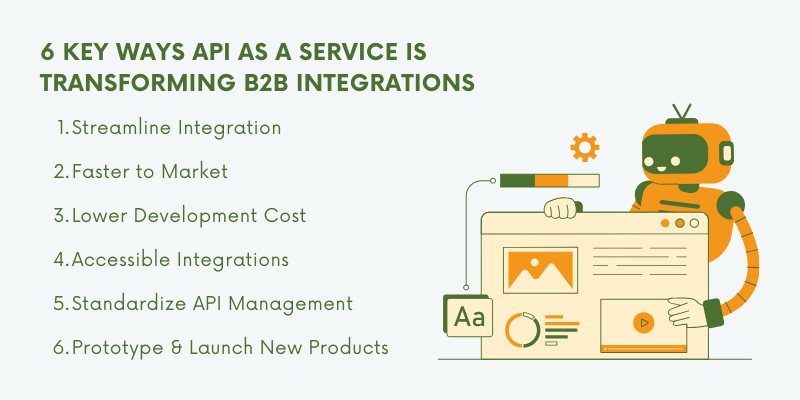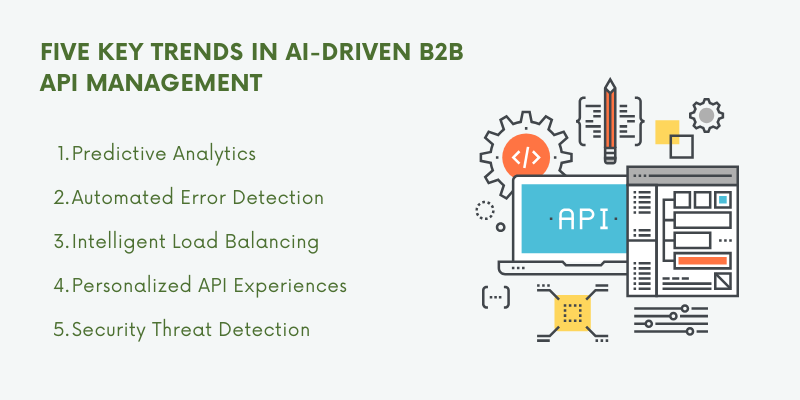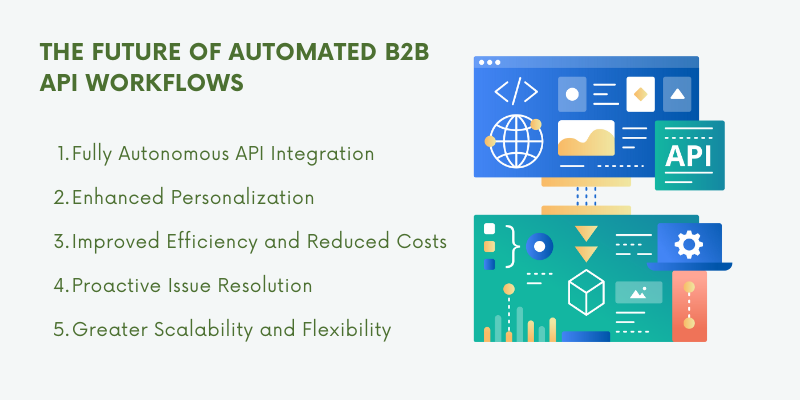The future of B2B API integration is fundamentally reshaping the way businesses collaborate, innovate, and scale across industries.
As companies increasingly rely on digital solutions to streamline operations, APIs (Application Programming Interfaces) have become essential for enabling seamless communication between disparate systems and facilitating smooth business transactions.
The rise of cloud computing, microservices, and the Internet of Things (IoT) has made B2B API integration even more critical in achieving operational efficiency and improving customer experiences.
By embracing B2B API integration, companies can enhance scalability, improve agility, and automate key processes. This digital transformation enables them to meet the growing demands of an interconnected global marketplace.
In the world of B2B, understanding what is B2B lead generation is essential. It refers to strategies for attracting and converting potential business clients, something that API-driven systems are well-positioned to support.
This article will delve into the key trends shaping the future of B2B API integration, including the move to cloud-based solutions, API security enhancements, and the growing importance of real-time data exchange.
Understanding these trends is essential for businesses looking to future-proof their operations and drive growth in an increasingly digital and interconnected world.
The Growth of Cloud-Based API Integration
The rise of cloud-based platforms for B2B API integration has transformed how businesses approach connectivity and collaboration.
With the increasing reliance on cloud computing, businesses are leveraging cloud-based APIs to facilitate seamless connections between their systems, partners, and customers.
These platforms enable businesses to access services and data from virtually anywhere, eliminating the need for on-premise infrastructure and enhancing overall efficiency.
Cloud-based API integration offers several advantages that drive business growth:
- Scalability: Cloud-based solutions allow businesses to scale their API usage based on demand. Whether expanding into new markets or handling spikes in traffic, cloud platforms offer the flexibility to adjust resources as needed.
- Cost Efficiency: By utilizing cloud services, businesses can reduce the need for expensive hardware, maintenance, and internal resources. Cloud-based APIs typically operate on a pay-as-you-go model, making them more cost-effective than traditional on-premise solutions.
- Flexibility: Cloud-based APIs enable businesses to integrate with a variety of platforms and applications, regardless of location or operating system. This flexibility helps businesses adapt quickly to changing market conditions and customer needs.
Understanding B2B marketing and how it drives cloud-based integrations can play a role in determining how businesses integrate these systems.
The advantages of flexibility and cost efficiency are central to driving growth through effective B2B development services.
API as a Service (APIaaS)
API as a Service (APIaaS) refers to a cloud-based solution that provides businesses with pre-built APIs that can be easily integrated into their systems, applications, and services.
Instead of building and managing APIs in-house, businesses can leverage third-party APIaaS platforms that offer ready-to-use API endpoints for a wide range of functionalities.
With APIaaS, businesses can focus on their core operations while utilizing powerful APIs to enhance their products and services.
These services are essential for businesses implementing web design and development strategies that prioritize scalability and user experience.

Here’s how APIaaS is transforming B2B integrations:
1. Streamlined Integration
APIaaS simplifies the process of connecting with external systems, allowing businesses to quickly integrate with various platforms, such as payment gateways, CRM tools, and cloud services.
This reduces the time and resources needed for traditional integration projects.
2. Faster Time to Market
With pre-built APIs, businesses can accelerate the development and deployment of new features and services, giving them a competitive edge by quickly meeting customer demands or launching new offerings.
3. Lower Development Costs
Instead of building custom APIs from scratch, businesses can leverage APIaaS to access robust, scalable APIs at a fraction of the cost.
This reduces the burden of hiring specialized development teams or investing in costly infrastructure.
4. Accessible Integrations
APIaaS makes advanced integrations accessible to smaller businesses that may not have the resources to build complex APIs in-house.
It helps SMEs remain competitive by enabling them to leverage enterprise-grade APIs without significant upfront investment.
5. Standardize API Management
APIaaS allows them to standardize API management and ensure security and compliance across their digital ecosystem.
6. Prototype & Launch New Products
Businesses can utilize APIaaS to quickly prototype and launch new products, gaining access to the tools they need to innovate and grow without the heavy investment required for custom API development.
This allows them to test ideas and scale as needed without incurring large overheads.
Explore Our B2B Web Development Services!
The Role of Artificial Intelligence and Automation: Integration of AI and Machine Learning in B2B APIs
Artificial Intelligence (AI) and Machine Learning (ML) are transforming the way businesses manage and integrate B2B APIs.
These technologies go beyond basic data exchange, allowing APIs to deliver real-time insights, predict trends, and optimize workflows.
AI also brings automation to key areas of API management, such as monitoring, troubleshooting, and performance optimization.
This transformation of the digital landscape also aligns with the role of Centric, helping businesses embrace these technologies to remain competitive.

Here are five key trends in AI-driven B2B API management:
- Predictive Analytics: AI analyzes API usage patterns to forecast potential issues, enabling proactive solutions and enhanced system reliability.
- Automated Error Detection: Machine learning algorithms quickly identify anomalies or errors in API calls, reducing downtime and operational disruptions.
- Intelligent Load Balancing: AI distributes traffic efficiently across API endpoints, preventing overload during peak periods and optimizing resource use.
- Personalized API Experiences: AI tailors API responses based on user behavior and historical data, improving customer satisfaction and engagement.
- Security Threat Detection: AI continuously monitors APIs for unusual activity or potential breaches, offering real-time alerts and bolstering data protection.
These advancements not only improve connectivity but also turn APIs into powerful tools for innovation, growth, and competitive advantage in today’s fast-paced digital landscape.
How Open APIs Are Driving Innovation in B2B Integrations?
Open APIs are transforming B2B integrations by allowing businesses to easily connect with external applications, platforms, and partners.
They create opportunities for innovation and growth but also introduce challenges that must be managed carefully.
Opportunities with Open APIs:
- Accelerating Product Development: Quickly integrate third-party services to reduce development time and bring products to market faster.
- Driving New Business Models: Monetize APIs through partnerships, usage-based pricing, or premium access.
- Ecosystems of Innovation: Foster collaboration between organizations to deliver value-added services and reach new markets.
- Improved Customization: Enable tailored, personalized solutions for B2B clients, boosting satisfaction and loyalty.
Here’s how to address these challenges:
- Security Risks: Protect against data breaches and unauthorized access with strong security measures.
- Data Privacy & Compliance: Ensure adherence to regulations like GDPR when sharing sensitive data.
- API Management: Monitor usage, control access, and maintain stability to prevent disruptions.
- Fragmentation Issues: Standardize formats to avoid incompatibility when integrating multiple APIs.
Open APIs, when managed properly, empower businesses to innovate faster, collaborate effectively, and scale seamlessly, making them essential for modern B2B integrations.
Microservices Architecture and B2B APIs
Microservices architecture is transforming B2B integrations by breaking complex applications into smaller, independent services that can be developed, deployed, and scaled separately.
Each microservice handles a specific business function and communicates with others through APIs, making it ideal for integrating multiple systems like CRM, ERP, and e-commerce platforms.
Unlike traditional monolithic systems, microservices offer flexibility and modularity, allowing businesses to connect with third-party systems more easily, streamline data exchange, and improve overall interoperability.
This strategy also complements best website builders for small business solutions, enabling more personalized, scalable solutions for growing companies.
Key Benefits of Microservices for B2B APIs:
- Scalability: Scale individual services based on demand without affecting the entire system.
- Flexibility: Add, modify, or replace services quickly to meet changing business needs.
- Faster Deployment: Teams can develop and deploy services independently for quicker integrations.
- Improved Resilience: Issues in one service don’t disrupt the whole system, reducing downtime.
By leveraging microservices, businesses can build agile, scalable, and reliable API ecosystems, ensuring seamless and future-ready B2B integrations.
Explore Our Web Design & Development Services!
Key Players and Trends in B2B API Marketplaces
B2B API marketplaces are revolutionizing the way businesses streamline their integration processes.
These platforms provide businesses with access to a wide range of pre-built APIs, saving time and resources that would otherwise be spent on in-house development.
They offer standardized API documentation, enabling quicker integration with minimal technical complexity, and businesses can scale operations based on demand with APIs that cater to growing needs.
Many marketplaces also offer customizable solutions, allowing businesses to select and integrate the services they need, optimizing performance and reducing costs
Additionally, these platforms foster collaboration by connecting businesses with various partners and service providers, enabling access to expertise and services that may not have been built internally.
Key players like RapidAPI, AWS Marketplace, Google Cloud Marketplace, and MuleSoft Anypoint Exchange lead the space, offering seamless integration and extensive API selections.
Top search engines are evolving with the rise of marketplaces, making it easier for businesses to access the APIs they need to scale operations effectively.
Emerging trends in B2B API marketplaces include a focus on security, data privacy compliance (e.g., GDPR), AI and automation for optimization, decentralized marketplaces using blockchain, and the rise of niche marketplaces catering to specific industries like healthcare, finance, and logistics.
How Businesses Are Leveraging These Platforms for Seamless Integration?
B2B API marketplaces are enabling businesses to streamline their integration processes in several key ways,
1. Access to Pre-Built APIs
Businesses can access a wide variety of pre-built APIs on these platforms, saving time and resources that would otherwise be spent on developing APIs in-house.
This allows for faster deployment of new features and services.
2. Standardization
API marketplaces often provide standardized API documentation, which helps businesses integrate APIs quickly and with minimal technical complexity.
This reduces the need for extensive development teams to handle integrations.
3. Scalability
Businesses can leverage APIs from multiple providers and scale their operations based on demand.
Whether expanding into new markets or launching new products, B2B API marketplaces allow for seamless scalability by providing APIs that can handle growing needs.
4. Customizability
Many API marketplaces offer customizable solutions, enabling businesses to choose specific functionalities and integrate them into their systems as needed.
This ensures that businesses only use the services they need, optimizing performance and reducing costs.
5. Collaboration Opportunities
B2B API marketplaces foster collaboration by connecting businesses with a variety of partners and third-party service providers.
This collaborative environment enables organizations to access expertise and new services that they may not have been able to build internally.
The Future of Automated B2B API Workflows
The future of automated B2B API which is the workflows that is driven by AI and automation, where businesses will rely on intelligent systems to manage, monitor, and optimize their API ecosystems.
These automated workflows will dramatically reduce the time spent on manual tasks, such as data entry, error correction, and manual API management, enabling businesses to focus on higher-value activities.

In the coming years, we can expect:
- Fully Autonomous API Integration: APIs will adapt dynamically to changing business needs, achieving seamless integration without requiring human intervention.
- Enhanced Personalization: AI-powered workflows will deliver real-time, highly personalized customer experiences based on behavior analysis and data-driven insights.
- Improved Efficiency and Reduced Costs: Automation will minimize errors, boost process speed, and reduce operational costs, resulting in faster deployment and more reliable services.
- Proactive Issue Resolution: AI will predict and resolve potential problems before they impact operations, ensuring smoother performance and reducing downtime.
- Greater Scalability and Flexibility: Automated workflows will allow businesses to easily scale their API systems to handle fluctuating demand while maintaining high performance and stability.
As these advancements evolve, businesses will gain smarter, faster, and more resilient API ecosystems, transforming B2B integrations into a key driver of innovation and global growth.
Conclusion
To recap, the major trends in B2B API integration include the rise of AI-driven management, serverless architectures, enhanced security, real-time data integration, and the continued growth of microservices.
These trends are transforming how businesses operate and collaborate, making API integration more efficient, secure, and scalable.
For companies looking to expand their digital presence, tech marketing agency play a crucial role in implementing the right B2B strategies.
Staying ahead of the curve in API adoption is crucial for businesses that want to remain competitive in an increasingly interconnected world.
The Future of B2B API Integration will continue to evolve as these trends unfold, enabling companies to leverage advanced technologies for growth.
By embracing the latest developments in B2B API integration, companies can optimize their operations, streamline collaboration, and drive innovation.
Looking to the future, B2B API integration will continue to be a key enabler of growth and success across industries.
Businesses that leverage these technologies effectively will be well-positioned to scale, adapt, and thrive in the ever-evolving digital landscape.








